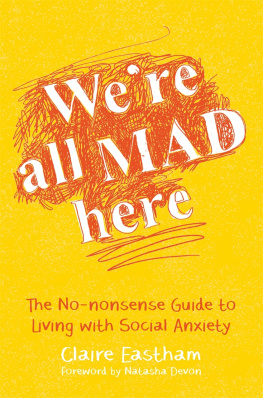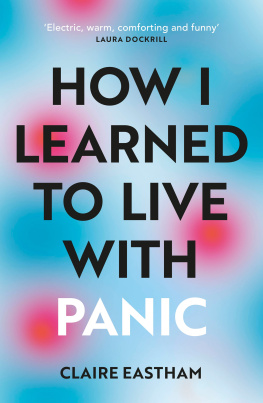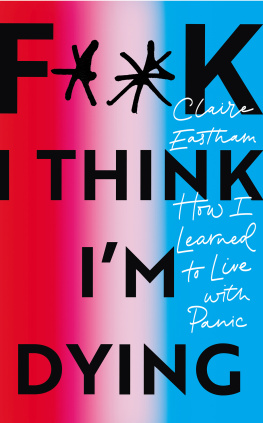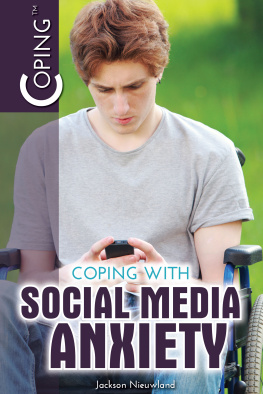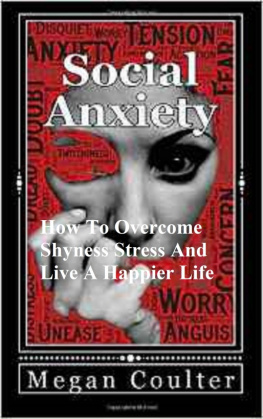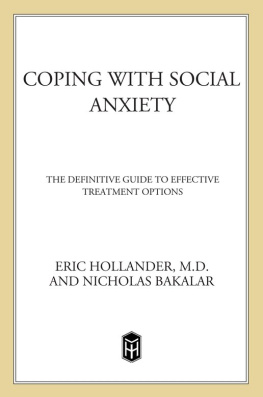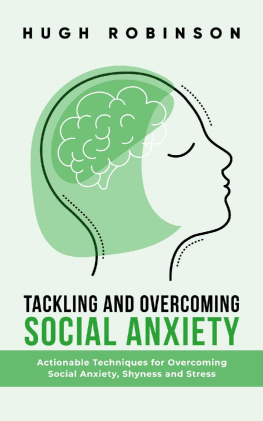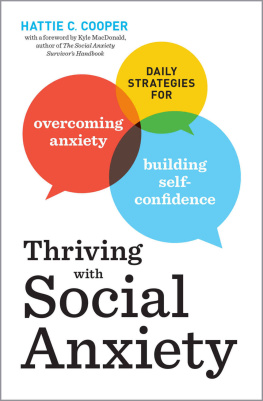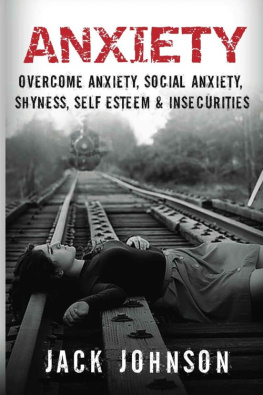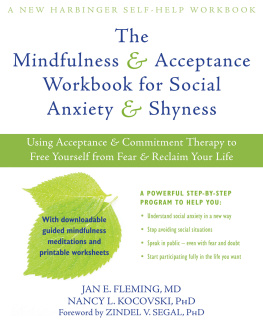

The No-Nonsense Guide
to Living with Social Anxiety
Claire Eastham
Foreword by Natasha Devon MBE

Jessica Kingsley Publishers
London and Philadelphia
CONTENTS
FOREWORD
When my mental illness was at its most acute, I used to scour bookshelves looking for anything that might help me make sense of what I was going through. What I found was an avalanche of highly triggering, instructional and self-pitying material, which, rather than leaving me feeling hopeful about the prospect of recovery, actually added to my depression and despair.
In desperation, I took to the internet. I stumbled into forums of users essentially competing to see who had the worst mental illness, forming exclusive clubs where tips for the most toxic possible coping mechanisms were shared. I was also subjected to endless contradictory advice on the subject of medication and best therapies and hideous trolling press pieces describing my illness as an imaginary phenomenon, attention-seeking and an insult to people who had real problems, like cancer. (That will teach me to click on the Daily Mail website.)
What I wanted, during that time, was a resource I could rely on. I wanted someone who understood how to simultaneously acknowledge the seriousness of my (very real) condition, but who could also reassure me that I was going to be okay. I needed practical advice that would allow me untangle all of the medical jargon and bold promises of cures advice which was not sponsored by specific therapy providers or pharmaceutical companies, and took into account that there is no magic solution that is guaranteed to work for everyone.
In short, what I really could have done with was this book.
A note about the author: Claire Easthams personality leaps from the pages of Were All Mad Here and gives you an enthusiastic cuddle. If you havent fallen in love with her by the time youre finished then we probably wouldnt get on.
Claire bounced into my life at a conference during the autumn of 2015 and asked if she could interview me for her blog. Something about her demeanour and way of expressing herself made me smile. I immediately deemed her to be one of lifes Ace People and acquiesced to her request.
We met for lunch in South Kensington a few weeks later. Claires subsequent take on proceedings turns self-deprecation into an art form. In her blog she describes her thought processes as she approached our table ( Oh my God, youre going to make a fool of yourself ). She declares that I am without a doubtintimidating (an observation that is both alarming and hilarious if you are me. Which I am). She finishes by detailing how she clumsily knock[ed] the saltshaker over and I politely pretend[ed] not to notice .
Ive never been able to pretend anything (anyone who has seen my resting bitch face when interrogating right-wing journalists on Sky News will attest). I genuinely didnt notice the saltshaker incident (as it shall be referred to, heretofore). I walked away from our lunch merely cherishing the distinct and unmistakable glow one gets when one has just encountered an official Ace Person.
Later, when my husband asked me what Id been up to that day, I described Claire as funny, Northern and not in any way a dick. This is, I still believe, a pretty good summary. (I consider humour and non-dickishness to be pre-requisites amongst my social acquaintances. Northern-ness is an added bonus. Not everyone, I realise, can be Northern. I myself, for example, am not and whilst I recognise it as a substantial flaw in my character I try not to beat myself up too much about it.)
It was the voice of the acute social anxiety Claire has lived with since adolescence that was echoing through her mind on the day of the saltshaker incident. Yet I, the casual observer, would never have known. Anxiety, whilst hideously all-consuming when youre engulfed in it, can be impossible to spot from the outside. Anyone you know could be experiencing it, no matter how self-assured or confident they might appear. I find that notion both distressing and strangely comforting.
Whilst we might all be mad here, we are definitely not alone.
Natasha Devon MBE
September 2016
Introduction
SOCIAL ANXIETY AND ME
Come on, you can do this. Just keep it together. Youve been practising all night, youll be fine. Why havent they arrived yet? This room is too small. Oh God, its happening again. Heart is racing and chest is tight. Why cant I move my arms properly? I wont be able to speak, Ill faint. Im going to make a fool of myself. I have to get out of here now.
This is the day I walked out of an interview for a job that I really wanted, minutes before it began. I had (what I now know to be) a panic attack the worst of my life.
I say walked, but it was more of a frantic run. I screamed in the confused HR womans face that I had the norovirus and need to leave at once! Not a bad off-the-cuff excuse, considering my brain was in pieces. Also, I dont think Ive ever used the phrase at once beforeor since. I seem to morph into Jane Austen mode when in dramatic situations!
Was the incident a shock? No. I knew before I went in that something bad was going to happen. Id known when I got up in the morning, when I was travelling to work and when I drank my coffee. The dread was there and I knew, but I just didnt want to believe it. I couldnt.
The next two weeks were a blur, filled with hysteria, emotional outbursts and constant panic, which made it impossible to think rationally. What was happening to me?



The term anxiety was first batted about when I was 14, although personally I think Ive had it from an early age. As a child I dreaded big family gatherings. My favourite thing to do was hang out with my grandma in the kitchen. Shed drink wine, chain smoke endless amounts of cigarettes and tell me stories. To be honest, not much has changed in that area, the only difference being that I can now join her in the drinking!
I struggled at secondary school and blushed violently whenever anyone spoke to me. I avoided most interactions and constantly worried about being asked a question in class. Think of me as a smoke alarm, primed to go off at the slightest indication of danger.
In English lessons we read Macbeth together as a class and everyone was expected to read a scene aloud. A nice inclusive activity, right? Wrong. It was my personal idea of torture! I knew when my turn was coming up because it was all done in alphabetical order. So for the first half of the lesson I didnt listen to a word that was said, because I was too busy freaking out. Despite being completely literate, as soon as it was my turn to read, I couldnt speak properly. The silence of the room was deafening as I stumbled over the words as fast as I could. It was agonising and I was convinced that everyone was laughing at me. To this day I have no idea what happened in Macbeth !
Another fond memory was doing role play exercises with the teacher in French class. A student would be randomly selected to come to the front and show off their French conversation skills. Why do teachers always think this type of thing is fun? Its not fun! Most teens find it awkward at best and excrutiating at worst. The not knowing if Id be chosen was the hardest part for me. I would hold my breath and physically brace myself as the teacher scanned the room. Thoughts like Ill die if she chooses me played on loop in my head. The one time that I was chosen, I could barely say my name I was freaking out so bad, aware that all eyes were on me and my trembling voice. Why couldnt I just get on with it like the other kids?
Next page
